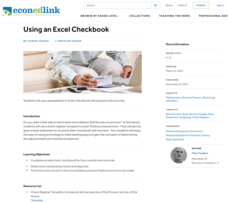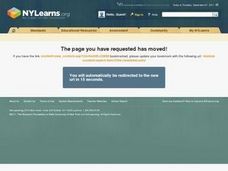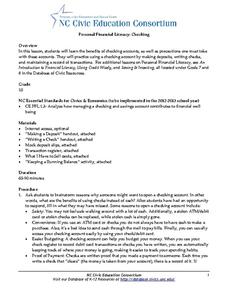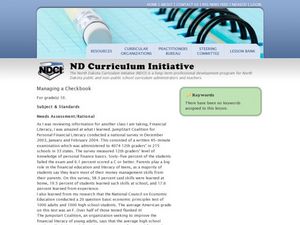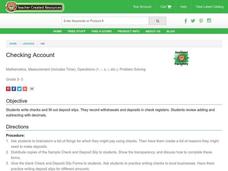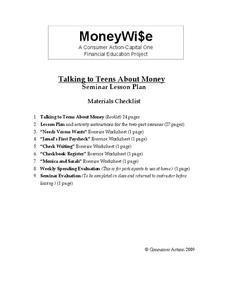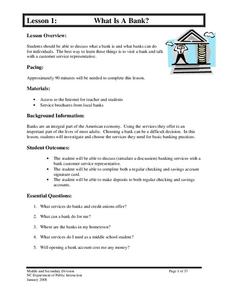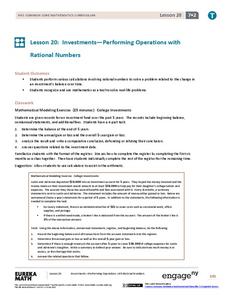Council for Economic Education
Using an Excel Checkbook
High school is the time that many scholars get their first jobs. Help young entrepreneurs apply economic principles to crucial skills for their new jobs and for functioning in society in general. They use Excel to balance a checkbook by...
Curated OER
The Nitty-Gritty of Checkbooks
Students explore how to maintain a checking account. They control, disburse money, and keep their checking account balance. Through a PowerPoint demonstration, video streaming and hands-on practice, students apply the information given...
Center for Literacy and Disability Studies
Personal Financial Literacy: Checking
After researching local banks and the checking account benefits offered by each, class members practice filling out a deposit slip, writing a check, and keeping a transaction register.
Texas Education Agency (TEA)
Piggy Bank vs. Bank – Choosing and Maintaining Your Account
Cha-ching! Using the practical resource, scholars investigate the different types of bank accounts and banking services available. Pupils view a PowerPoint, practice writing checks, and complete a checking account research project.
Curated OER
Managing a Checkbook
How do grown ups do it? Teach your upper graders the ins and outs of personal finance by having them use their algebra skills to balance a checkbook. They examine the financial side of math, set up a checking account, and balance their...
Federal Reserve Bank
Banking on Debit Cards
What are the advantages and disadvantages of using a credit card versus a debit card? What are the costs of using a debit card irresponsibly? Here you'll find a lesson on key concepts that every learner should know...
Finance in the Classroom
Unit on Checking
As part of a four-lesson unit on personal finances, class members practice using a checkbook. Exercises include writing checks, filling out deposit and withdrawal slips, and keeping a check register.
Curated OER
Checking Account
Students keep track of finances in a check register. For this checking account lesson, students practice writing checks and deposit slips as they add and subtract decimal amounts in order to balance a checkbook in a register.
Beyond Benign
Final Budget
Be sure you have enough money to build a house. The 14th lesson in a 15-part series teaches young learners to use checkbook registers. They write checks for the amounts they spend on various housing materials and keep track of...
Federal Reserve Bank
Cash the Check and Track the Dough
From checking and savings accounts to learning the importance of maintaining records and balancing a bank account, prepare your students to become financially independent and savvy adults, and explore all the intricacies of owning a bank...
Consumer Action
Talking to Teens About Money
Your teenagers are probably very good at spending money, but how good are they at managing it? Teach class members about banking, checking accounts, interest rates, car insurance, and many other relevant concepts with a series of...
Federal Reserve Bank
Lesson 2: In the Aftermath
Don't wait for a crisis to get your finances together. An economics lesson demonstrates the importance of understanding crucial documents, banking basics, and financial tools with the focus on Hurricane Katrina in 2005 and its effects.
Federal Reserve Bank
It's Your Paycheck
Beyond reading and arithmetic, one of the most important skills for graduating seniors to have is fiscal literacy and responsibility. Start them on the right financial track with nine lessons that focus on a variety of important...
Curated OER
Addition and Subtraction: By Checkbook
Young scholars develop an understanding of the need for adding and subtraction skills in balancing a checkbook.
Curated OER
Using A Checkbook
Students discover how to correctly write a check, fill out a deposit slip, and use a check register. They explain the concept of balancing a checkbook. After a lecture/demo, students use handouts imbedded in this plan to practice using...
Curated OER
Buying New Stuff
Young spenders take a look at the best ways to save and spend money. This type of financial education is lacking in schools, so implementing this lesson would be of great value to your students. Things like bank checking account fees,...
Federal Reserve Bank
A Penny Saved
Budgeting, net vs. gross pay, savings, and fees are all key elements of personal financing and essential for your class members to learn about as young adults.
Practical Money Skills
Using Banking Services
Using a bank is a privilege and a responsibility for young consumers. Teach them the important terms and details about creating accounts, using an ATM, and maintaining a credit card.
Curated OER
Spending Money
Fourth graders become familiar with the ways people exchange goods and services. In this spending money lesson, 4th graders listen to a chapter from Henry and Beezus and record Henry's earnings and money spent. Students use correct...
North Carolina Department of Public Instruction
What Is A Bank?
You're never too young to learn about banking and personal finance. Use a set of seven banking lessons to teach middle schoolers about checking and savings accounts, interest rates, loans and credit cards, and safety deposit boxes.
EngageNY
Investments—Performing Operations with Rational Numbers
Partners fill out a register to record transactions on a college investment account. They use the amounts listed to calculate the running and current balance of the account, providing experience in adding and subtracting rational numbers.
Curated OER
FINANCE AND RESPONSIBLE LENDING.
Students study the role of banks, lending and their services. In this analysis lesson plan, students learn about savings, checking accounts and lending and the importance of banks as financial intermediaries.
Curated OER
Business: Making a Budget
Students plan a one-month budget, allowing for unexpected expenses. Using checkbook skills, they pay mock bills. Working in small groups, students watch a teacher-prepared Powerpoint presentation, visit financial Websites, and utilize...
Curated OER
Checkbook Math
Twelfth graders simulate balancing checkbooks by applying required mathematical operations. They examine newspaper ads from banks and compare various services they offer. They discuss the uses of credit and debit cards.
